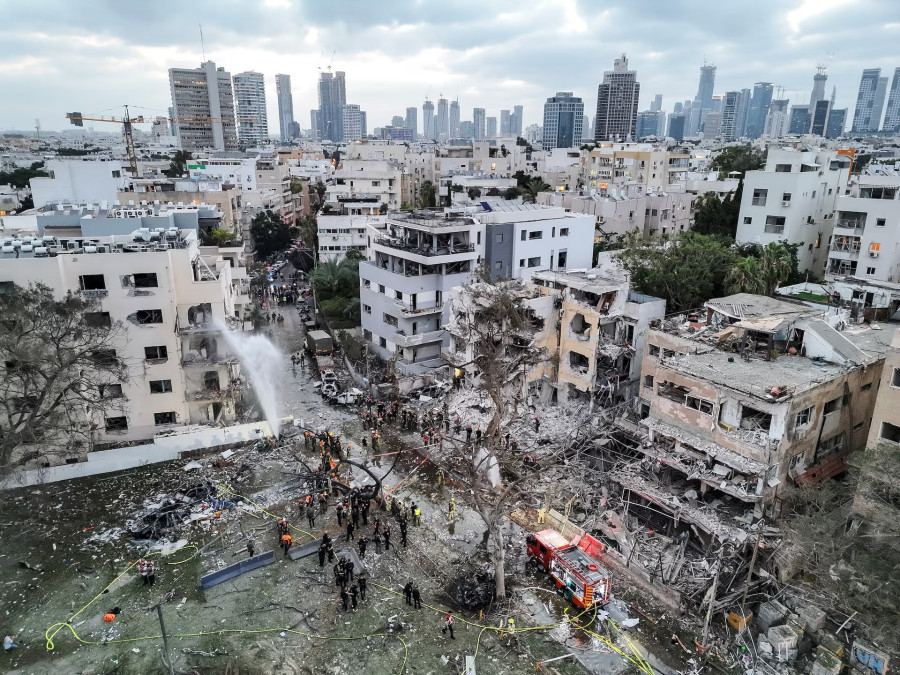National
Nepal weighs rescue options as Israel’s war with Iran drags on
With airports shut and borders clogged, officials say repatriating over 5,000 Nepalis could take time.
Anil Giri
As the fighting between Israel and Iran intensifies, the Nepal government has started considering alternatives to bring back its citizens from Israel should the conflict escalate further. But repatriating Nepali citizens living and working in Israel is, in itself, a Herculean task, say officials and diplomats.
The first challenge is the sheer number of such Nepali nationals. The second is the Israeli airports that currently remain closed. And third, the land routes out of Israel via Jordan may also be difficult to arrange with so many people looking to leave at once.
“It is extremely difficult to bring Nepali citizens back within a few days,” said Nepali ambassador to Israel Dhan Prasad Pandit. “There are no flights. Immediate evacuation is not possible.”
Amid growing insecurity due to the escalating conflict, the Nepali Embassy in Israel has begun registering citizens for potential repatriation. As the situation worsens instead of easing, many have started contacting the Nepali Embassy in Tel Aviv, requesting assistance to return home.
Pandit said fear among Nepalis studying or working in Israel has grown following the heavy damage caused by Iran’s missile attacks. As a result, after instructions from Kathmandu, the embassy issued a public notice on Wednesday urging Nepali citizens in Israel to register online. Pandit said the registration is intended for rescue and repatriation purposes, should the need arise.
At present, although they are frightened, Nepali citizens remain safe.
“In view of the recent developments in Israel, the embassy has started collecting information to facilitate rescue, repatriation, and other assistance for Nepali citizens who are in distress or fear,” the embassy stated in its notice.
Several other countries have urged their citizens to return through land routes due the airport shutdown. Some have even recalled their diplomatic staff from Israel. According to the Ministry of Foreign Affairs, around 5,500 Nepalis are currently in Israel.
“There’s now the issue of how to safely evacuate Nepalis after registration,” Ambassador Pandit said.
Even travelling by land is difficult because neighbouring Jordan is under heavy pressure and cannot easily grant visas to everyone trying to leave Israel. The online visa system is overwhelmed, which makes it difficult for so many people to get a visa within a few days, said Pandit.
Under normal circumstances, it takes at least 15 days to get a Jordanian visa, which is considered the safest route out of Israel. Another viable route is Cyprus.
Pandit cited the example of Biratnager Mayor Nagesh Koirala, who managed to secure a visa and return home via Jordan, Kuwait, India, and finally Nepal. He had visited Israel as a guest of the Israeli government and paid half of the visa fee himself, which was $600, said Pandit. “But that isn’t a feasible option for everyone.”
Air evacuation is also complicated. It is not certain when airports will reopen, and once they do, there will be a rush, as many countries will send their planes to evacuate their nationals. Evacuating 5,500 to 6,500 Nepalis could take several days or even weeks as Nepal would need to arrange multiple flights, one after another, to bring everyone back, according to officials.
Other land routes, such as through Egypt, Lebanon, or Syria, are not viable because Israel is still fighting with Hamas in Gaza. Israeli forces are also clashing with Hezbollah so the Lebanese route is not safe either. And the security situation in Syria remains unstable. So the only viable option is Jordan, Pandit said. But as many nations are urging their citizens to leave via Jordan, officials there are also under pressure to manage visas and ensure safe passage, he said.
“It is not easy to obtain a Jordanian visa from here at the moment,” said Ambassador Pandit, “but if any Nepali wants to go to a neighboring country from Israel, we can facilitate that.”
On Monday, a meeting of government secretaries, chaired by Chief Secretary Ek Narayan Aryal, instructed various ministries to stay prepared to ensure the safety of Nepali citizens and to carry out rescue operations if necessary. The meeting also directed that the security of Nepali citizens be given top priority.
“The meeting concluded that, given the conflict, Nepalis residing in Israel or in neighboring countries could be affected. Therefore, the Ministry of Foreign Affairs and the Ministry of Labor, Employment, and Social Security were instructed to gather updated information on their situation from Nepali diplomatic missions in those countries,” said a statement issued after the meeting.
According to the statement, the updated information is to be shared with the Prime Minister’s Office and the Ministry of Home Affairs. Chief Secretary Aryal directed that, should the need for evacuation arise, the Ministry of Home Affairs and the Ministry of Foreign Affairs must immediately coordinate and make necessary arrangements.
“As of now, Nepali citizens living and working inside Israel are reported to be safe, and our embassy has advised them to remain cautious,” said Krishna Prasad Dhakal, the foreign ministry spokesperson. “The government is discussing various options to bring them back if the war escalates.”
“We don’t want to create panic by announcing an evacuation now, but we are discussing various options,” he said.
“It all depends on how the situation evolves. If repatriation through land is needed, we are also discussing how to arrange for visas and other things,” said Dhakal.




 8.22°C Kathmandu
8.22°C Kathmandu














